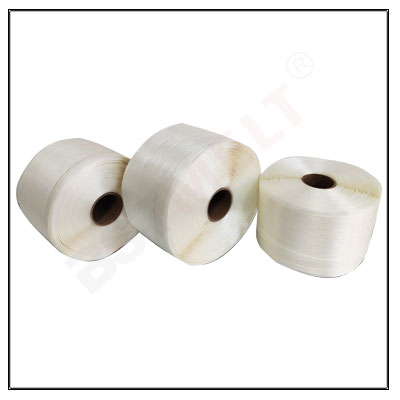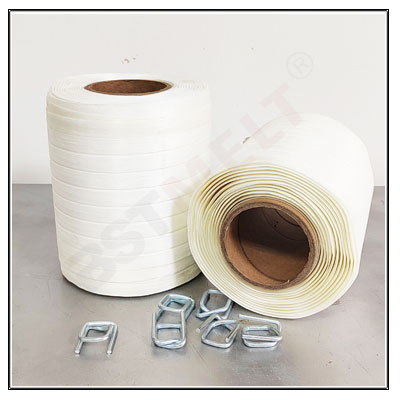In the ever-evolving landscape of modern agriculture, sustainability has emerged as a paramount concern. As farmers strive to optimize their practices for both productivity and environmental stewardship, every aspect of the agricultural process comes under scrutiny. One such area of focus is baling strapping – a seemingly small but significant component of farming operations with far-reaching implications for the environment.


Baling strapping, typically made from materials such as plastic, polyester, or steel, plays a crucial role in securing bales of hay, straw, and other agricultural products for storage, transportation, and sale. While seemingly innocuous, the choice of baling strapping material can have profound effects on the environment, ranging from resource depletion to pollution and waste accumulation.
Plastic baling strapping, for instance, has long been a staple in farming practices due to its affordability and availability. However, its environmental impact is cause for concern. Plastic strapping, derived from non-renewable petroleum-based sources, contributes to carbon emissions and fossil fuel consumption during production. Moreover, plastic strapping poses a significant risk of pollution, as discarded straps can end up in landfills or contaminate natural habitats, posing threats to wildlife and ecosystems.
In contrast, alternatives such as polyester and steel strapping offer potential environmental benefits. Polyester strapping, made from recyclable materials, provides a more sustainable option for farmers seeking to minimize their carbon footprint. Similarly, steel strapping, though less commonly used in agricultural applications, boasts high durability and recyclability, making it an attractive choice for those prioritizing environmental responsibility.
However, the environmental impact of baling strapping extends beyond its composition to its broader implications for farming practices. The choice of strapping material can influence factors such as waste generation, resource consumption, and greenhouse gas emissions throughout the agricultural supply chain.
For example, the use of durable, long-lasting strapping materials such as steel or polyester can reduce the frequency of replacements, thereby minimizing waste generation and resource consumption over time. Conversely, the use of disposable or low-quality strapping materials may result in higher rates of strap breakage, necessitating more frequent replacements and contributing to waste accumulation.
Moreover, the disposal of baling strapping at the end of its lifecycle presents challenges for farmers and waste management systems alike. While recyclable materials such as steel and polyester strapping can be repurposed or recycled, plastic strapping often ends up in landfills or incinerators, exacerbating environmental problems such as soil and water pollution and greenhouse gas emissions.
In light of these considerations, there is a growing imperative for farmers to evaluate the environmental impact of their baling strapping choices and adopt more sustainable alternatives where possible. This shift towards environmentally responsible baling practices requires a multifaceted approach, encompassing material selection, waste management strategies, and broader efforts to promote sustainability within the agricultural sector.
One promising avenue for reducing the environmental impact of baling strapping is the adoption of biodegradable or compostable materials. Innovations in bioplastics and bio-based polymers offer alternatives to traditional petroleum-derived plastics, providing farmers with environmentally friendly options for baling strapping. While these materials may present challenges in terms of cost and performance, ongoing research and development efforts hold promise for improving their viability and scalability in agricultural applications.
Furthermore, advancements in recycling and waste management infrastructure can help mitigate the environmental impact of baling strapping by facilitating the collection, sorting, and processing of used straps for reuse or recycling. Collaborative initiatives between farmers, manufacturers, and waste management organizations can promote the development of closed-loop systems for baling strapping, ensuring that materials are recovered and repurposed in a sustainable manner.
In addition to material choices and waste management practices, there is also a need for broader systemic changes to promote sustainability within the agricultural sector. Government policies, financial incentives, and educational programs can incentivize farmers to adopt environmentally responsible practices, including the use of sustainable baling strapping materials and practices.
Ultimately, the environmental impact of baling strapping in farming practices underscores the interconnectedness of agricultural systems with broader environmental and social concerns. By reevaluating their baling practices and embracing more sustainable alternatives, farmers can play a pivotal role in mitigating environmental degradation and promoting a more resilient and sustainable future for agriculture. Through collective action and innovation, the agricultural sector can transition towards practices that not only enhance productivity and profitability but also safeguard the planet for future generations.

BSTSTRAP
No.30 building, Wuxing High-tech Venture Park
Huzhou City, Zhejiang Province,China
Whatsapp:+86 136 6574 4776
Monday to Saturday 9 am to 5 pm
hailey@bststrap.com
Send us your enquiry anytime
Others News
 The Advantages of Bonded Strapping: A Cost-Effective and Gentle Solution for Fragile Goods
The Advantages of Bonded Strapping: A Cost-Effective and Gentle Solution for Fragile Goods Breaking Ground: The Rise of Bonded Straps in Industrial Applications
Breaking Ground: The Rise of Bonded Straps in Industrial Applications Bonded Strapping: The Versatile Solution for Tying Bales of Cardboard, Plastic, and Recycling
Bonded Strapping: The Versatile Solution for Tying Bales of Cardboard, Plastic, and Recycling Bonded Corded Polyester Strapping: The Ideal Solution for Pallets and Product Bundling
Bonded Corded Polyester Strapping: The Ideal Solution for Pallets and Product Bundling